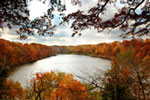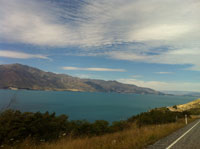  Lake Facts for Kids Lake Facts for Kids
Enjoy learning about lakes with our fun facts for kids. Read about the Great Lakes of North America, how lakes are formed, how deep lakes can get, different types of lakes, where the highest lake in the world is located, and much more. | | |
Each lake has a larger catchment area (drainage basin, watershed) which is a large encompassing land area where surface water from rain, snow/ice melt, or rivers converges into the lower lying lake.
The deepest lake in the world is Lake Baikal in Siberia, Russia. It is 1,637 m (5,371 ft) at its deepest point. Excluding the Caspian Sea it is the also the largest lake by volume in the world.
The Caspian Sea has characteristics of being both a sea and a lake. The saltwater sea used to be connected to the world's oceans but became landlocked around 5.5 million years ago. It is often classed as a lake due to a lakes definition which would make it the largest lake in the world at 370,400 km² (143,244 mi²).
Located on the border of the United States and Canada are the Great Lakes of North America. They include 5 lakes: Michigan, Huran, Erie, Ontario, and Superior which together contain around 21% of the world's freshwater supply.
There are many natural processes that can form lakes. The advancement and retreat of glaciers over millions of years can leave behind bowl-shaped depressions which fill. Lakes can also form by tectonic related changes of the landscape, or by landslides that cause water blockages. Crater lakes and calderas are formed in volcanic craters. Oxbow lakes are small, crescent-shaped lakes created by the meandering of rivers over time.
A lot of lakes today are artificially made to generate hydro-electric power, for domestic water supply, for industrial or agricultural use, or for aesthetic and recreational purposes. One of the lakes on Saturn's moon Titan called Kraken Mare is a massive 388,500 km² (150,000 mi²) making it larger than the Caspian Sea. The liquid is not water though (Titan's average temperature is -181 °C (-293.8 °F) so water would be frozen), instead it is a lake of liquid gas (methane and ethane).
| 
|
|